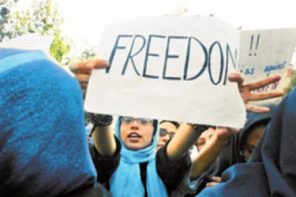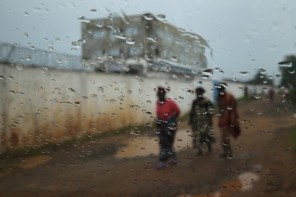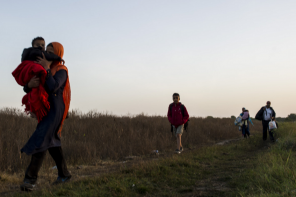I spent last week in San Diego, at the Joan B. Kroc Institute for Peace & Justice, talking about women, media, power and peace. The three-day conference brought together a kick-ass group of creative, dedicated women from across the media sphere — traditional journalism, documentary film, crisis mapping, blogging, and more. Here are a few projects and people I’m still thinking about:
The Sari Soldiers, a film by Julie Bridgham. It’s difficult to overstate what an amazing piece of work this is. Bridgham lived in Nepal for seven years; three of those, at the height of the country’s Maoist insurgency and what amounts to the overthrow of the monarchy, she spent filming six women on different sides of the conflict. A woman named Devi, a Dalit mother whose daughter is disappeared by the Nepali army in retaliation for Devi’s testimony to a local paper about the Nepali Army abuse and murder of her nice. Devi spends years trying to find out what happened to her daughter. Along the way, we meet a brave human rights activist who takes up Devi’s case and brings it to the wider world, and Devi’s family — including her soft-spoken husband. Conversations, captured verite-style, between the two of them are some of the most tender, honest bits of filmmaking I’ve ever seen.
There are four other women in this film — a village elder who supports the monarchy, a young army officer in training, a democracy activist and a Maoist rebel, now serving in Parliament. Their intertwining stories prove, as the film’s website says, “there are more than two sides to every story.” They also go a long way toward showing us that don’t think women as a monolithic block — and that even in times of crisis, they are agents with deep power.
WorldPulse, a magazine and blogsite written by women around the world. Though the conversations are all in English, there’s a lot to learn from the many discussions happening here.
Heather Ford, a digital ethnographer and a wonderfully smart, reflective member of the team behind Ushahidi, the mapping tool that came out of Kenya’s 2007 electoral crisis. Her blog is a treasure trove of thoughtful reading on the digital world, including the hegemony you didn’t realize was happening over at Wikipedia.
Finally, though they weren’t at the conference, one more worthy project on my mind for other reasons. The founders of GroundTruth Initiative just got married, bringing the power of love to participatory development. Among other cool things, they’re using mapping technologies to make the invisible visible. Think Voice of the Voiceless 2.0.
Keep it up, mighty media mavens. We need you.



